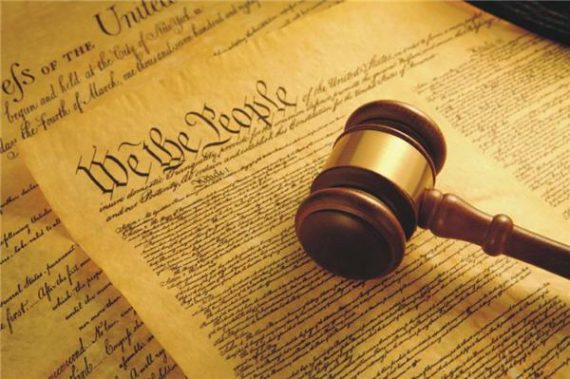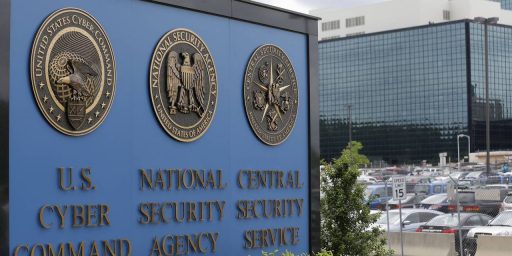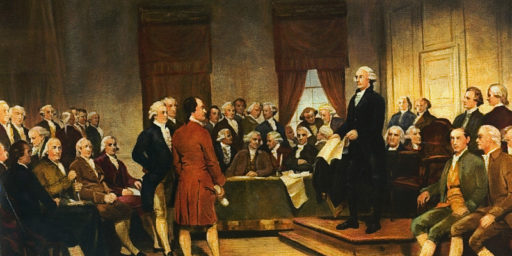ACLU Files Suit Over NSA Phone Records Data Mining
The ACLU is suing over the NSA's data mining. Does it really have a chance?
The American Civil Liberties Union is at the head of a list of Plaintiffs in a new lawsuit against Director of National Intelligence James Clapper and other government officials over the National Security Agency program that involved accessing phone records from all the major telecommunications companies:
WASHINGTON — The American Civil Liberties Union sued the Obama administration on Tuesday over its “dragnet” collection of logs of domestic phone calls, contending that the once-secret program — whose existence was exposed last week by a former National Security Agency contractor — is illegal and asking a judge to stop it and order the records purged.
The lawsuit could set up an eventual Supreme Court test. It could also focus attention on this disclosure amid the larger heap of top secret surveillance matters revealed by Edward J. Snowden, the former N.S.A. contractor who came forward Sunday to say he was their source.
The program “gives the government a comprehensive record of our associations and public movements, revealing a wealth of detail about our familial, political, professional, religious and intimate associations,” the complaint says, adding that it “is likely to have a chilling effect on whistle-blowers and others who would otherwise contact” the A.C.L.U. for legal assistance.
The Justice Department declined to comment on the suit.
In other lawsuits against national security policies, the government has often persuaded courts to dismiss them without ruling on the merits by arguing that litigation would reveal state secrets or that the plaintiffs could not prove they were personally affected and so lacked standing in court.
This case may be different. The government has now declassified the existence of the program. And the A.C.L.U. is a customer of Verizon Business Network Services — the recipient of a leaked secret court order for all its domestic calling records — which it says gives it standing.
The call logging program keeps a record of “metadata” from domestic phone calls, including which numbers were dialed and received, from which location, and the time and duration.
The effort began as part of the Bush administration’s post-Sept. 11 programs of surveillance without court approval, which has continued since 2006 with the blessing of a national security court. The court has secretly ruled that bulk surveillance is authorized by a section of the Patriot Act that allows the F.B.I. to obtain “business records” relevant to a counterterrorism investigation.
Congress never openly voted to authorize the collection of logs of hundreds of millions of domestic calls, but some lawmakers were secretly briefed. Some members of Congress have backed the program as a useful counterterrorism tool; others have denounced it.
“The administration claims authority to sift through details of our private lives because the Patriot Act says that it can,” Representative F. James Sensenbrenner Jr., Republican of Wisconsin, wrote in a letter to Attorney General Eric H. Holder Jr. “I disagree. I authored the Patriot Act, and this is an abuse of that law.”
Over the weekend, James R. Clapper Jr., the director of national intelligence, said that officials may access the database only if they can meet a legal justification — “reasonable suspicion, based on specific facts, that the particular basis for the query is associated with a foreign terrorist organization.” Queries are audited under the oversight of the national security court.
Timothy Edgar, a former civil liberties official on intelligence matters in the Bush and Obama administrations who worked on building safeguards into the phone log program, said the notion underlying the limits was that people’s privacy is not invaded by having their records collected, but only when a human examines them.
“When you have important reasons why that collection needs to take place on a scale that is much larger than case-by-case or individual obtaining of records,” he said, “then one of the ways you try to deal with the privacy issue is you think carefully about having a set of safeguards that basically say, ‘O.K., yes, this has major privacy implications, but what can we do on the back end to address those?’ ”
Still, privacy advocates say the existence of the database will erode the sense of living in a free society: whenever Americans pick up a phone, they now face the consideration of whether they want the record of that call to go into the government’s files.
Moreover, while use of the database is now limited to terrorism, history has shown that new government powers granted for one purpose often end up applied to others. An expanded search warrant authority justified by the Sept. 11 attacks, for example, was used far more often in routine investigations like suspected drug, fraud and tax offenses.
Given that, it isn’t inconceivable that we’ll one day learn that data gathered by these NSA programs will end up being used in non-terrorism cases. Indeed, some would say that it’s actually fairly inevitable. That alone is a reason to be concerned about the programs that have been revealed over the past week. While we certainly want open lines of communication between intelligence and law enforcement to avoid the problems that led to missed signals during the months before 9/11, there are distinct dangers in utilizing information gathered by intelligence agencies in non-terrorism law enforcement cases. Most importantly, that’s because data gathered via intelligence agencies is often obtained by means that don’t necessarily comply with the Constitution or the laws of Criminal Procedure. This concern would be especially true in non-terror related cases, where the justification for using powers that were granted to the state in the wake of 9/11 in those kinds of cases is precisely the kind of ratcheting up that civil liberties advocates warned about when the PATRIOT Act was being debated, to the extent there was every any kind of substantive debate, in Congress in the wake of 9/11.
As for the ACLU’s lawsuit itself, I’m not sure that it’s going to have much of a chance in the Courts. If, as appears to be the case, the NSA program was authorized by the law, then it’s unclear to me what legal grounds there are for challenging the NSA’s actions in this matter in a court. That doesn’t mean that the lawsuit shouldn’t be filed, of course. Perhaps they’ll find sympathetic judges who will try to find a way to restrain the power of the Federal Government to peak into the private lives of individuals with little particularized justification. At the very least, the lawsuit will keep the issue in the public eye and possibly cause people to question the Federal Government’s actions and motives in the name of the “war on terror” than they have been willing to over the past twelve years. One can dream, I suppose.
Here’s the complaint:







Congress should mandate all network communications be strongly encrypted to a person. It’s 2013. Why isn’t strong encryption as ubiquitous as cable modems? Watch demand skyrocket now.
Of course, It will never happen. It cuts into the eavesdropping bidness, as evidenced by Mr. Snowden’s salary, demand created by American fear and inaction.
ACLU member since 2002. The single most important NGO in the country when it comes to protecting Americans’ rights. They’re not perfect, but they’re right about 95% of the time. If I was a billionaire my wallet would be wide open to them.
I don’t see that this is much different than their last foray into this issue in 2012 – Amnesty et al. V. Clapper.
All passion, no street smarts.
When considering how call logging might be used in the future, consider how call logging has been used in the past. We can probably assume that NSA has been collecting the call logs from all carriers over the past 11 years. So what has happened?
Is there any instance where those call logs have been used in a unjustified way?
While I understand that Americans may be concerned about being “outted” for a shady business deal, or a extra martital affair, or drug dealling, or purchase of child porn, or any other thing they might not be proud to have the public know, have any of the NSA call logs been used to expose people?
Frankly, I am much more concerned about NSA’s internal security. That’s why Snowfen needs to be prosecuted, and the security procedures reviewed.